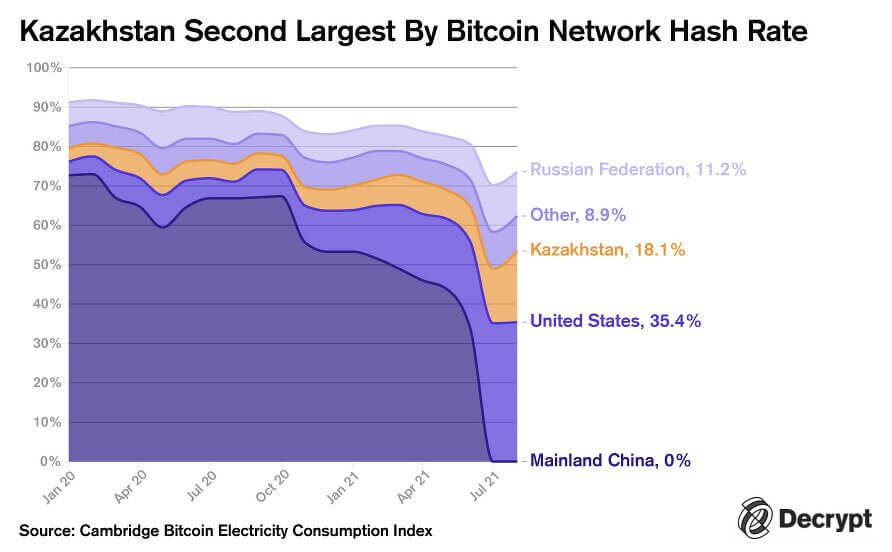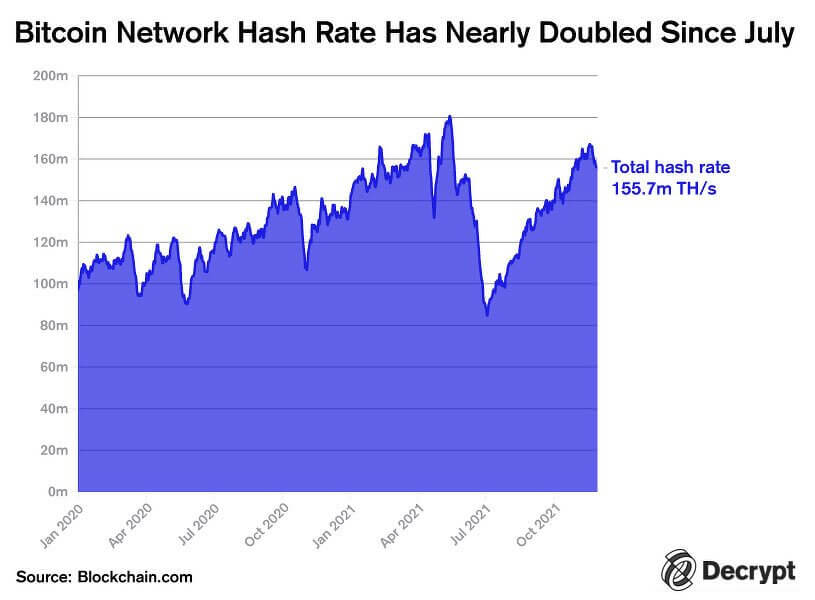After the ban on Bitcoin mining in China, local miners had no choice but to collect their equipment and move to another country. The destination for many of them was Kazakhstan, which geographically borders on China. The country was chosen due to the convenience of moving and relatively low electricity tariffs. However, now a massive influx of miners threatens to overload the power grid of Kazakhstan. Let's talk about what is happening in more detail.
Recall that the mining of cryptocurrencies based on the Proof-of-Work consensus algorithm is a really energy-consuming task that threatens the supply of electricity in entire states. For example, in May, the Iranian government issued a ban on mining cryptocurrency for several months until September.The reason for this was interruptions in the supply of electricity, due to which ordinary residents could remain without electricity.
For clarity, the exactingness of the Bitcoin network, you can recall the table in which the representatives of the Solana project estimated the energy consumption of various popular actions and compared them with the activity in the world of cryptocurrencies.
From this we can conclude that processing transfers on the Bitcoin network requires a huge amount of energy. This is primarily due to the popularity of BTC mining, which causes significant competition in the niche. And it is this problem that entire countries are experiencing.
Where bitcoins are mined the most
Initially, the government of Kazakhstan was neutral about the influx of miners, but when they began to consume too much electricity, they began to impose certain restrictions on them. According to the Cambridge Bitcoin Electricity Consumption Index (CBECI), from the beginning of the year to August, the share of Kazakhstan in the cryptocurrency hashrate increased from 6 to 18 percent . That is, the country very quickly took the second place in the world in terms of the presence of miners, ahead of even Russia.

The share of different countries in the Bitcoin hashrate
However, the above data was released by experts at the University of Cambridge in August, that is, more than three months ago. Over the past time, the Bitcoin hash rate has increased significantly. And even if the share of Kazakhstani miners in it remained the same, the total capacity of their equipment increased from 19.7 to 28.2 million terahashes per second .
By comparison, a 2,500-device mining center, like the one that Xive was recently forced to close in southern Kazakhstan, generates "only" 57,500 terahashes per second. That is, the total amount of computing power of the country's miners is approximately 147 such centers.
According to Decrypt representatives , Xive co-founder Didar Beckbau said in October that local miners have serious problems with the supply of electricity. Due to frequent disconnections from the network, many of them were again forced to collect their equipment and move to another location. As we have already noted, on the eve of the same fate befell one of the centers of Xive. Beckbau posted a video of the collapse of the mining center on his Twitter account.
According to the nongovernmental organization International Energy Agency, Kazakhstan has historically produced twice as much electricity as it consumed. At the same time, the GlobalPetrolPrices portal reports that in March energy prices in the country averaged $ 0.04 per kilowatt-hour . This is half the average tariff in mainland China and almost three times less than the tariff in the United States.

Bitcoin hash rate has almost doubled since July this year
According to the National Association of the Blockchain and Data Center Industry, the Kazakh government expected mining to give its economy $ 1.5 billion over the next five years . But many miners still work in the country without any registration and pay almost no taxes, so their presence does not bring any benefit.
We believe that the sharp increase in energy consumption in the country against the background of the influx of Bitcoin miners is quite predictable, but states need to be prepared for them. Failure to do so could create problems in the supply of electricity that would affect ordinary citizens. Well, it is not always possible to guarantee the payment of taxes from such activity.


إرسال تعليق